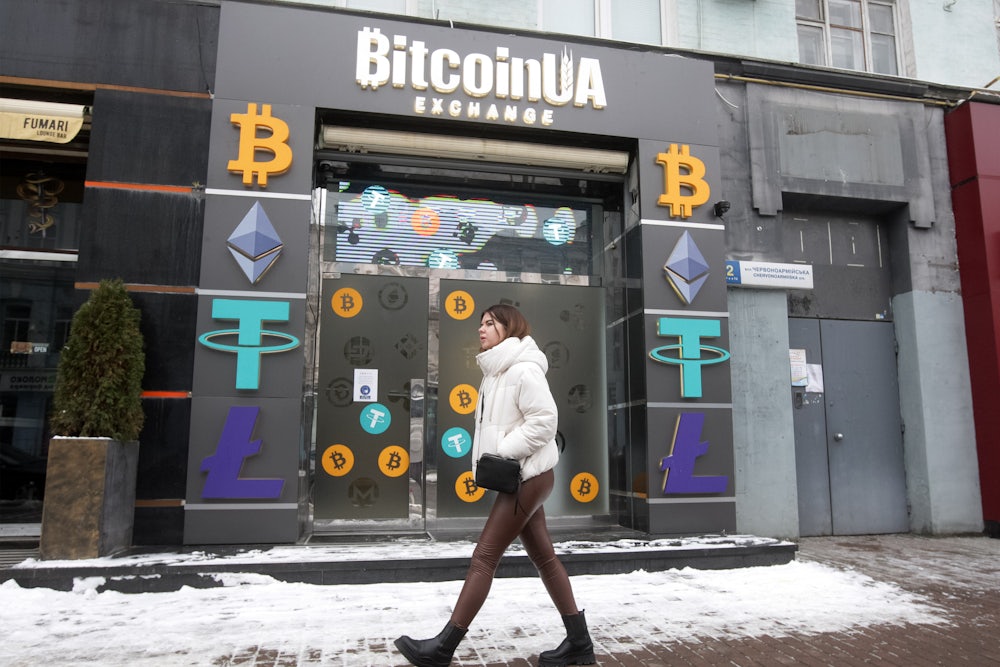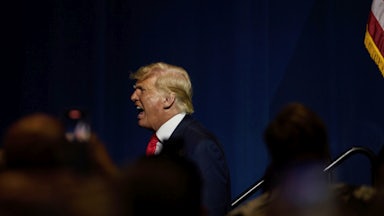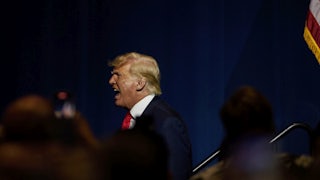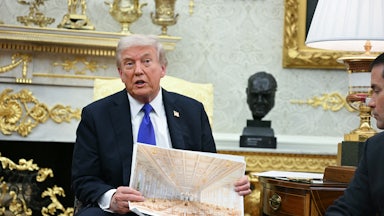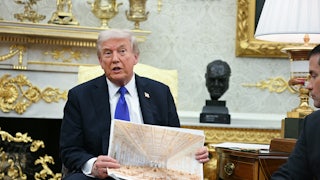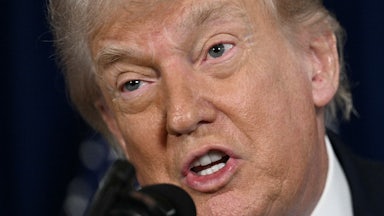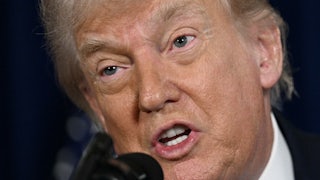Last month, a non-fungible token, or NFT, collector who goes by the pseudonymous Twitter handle @punk6529 posted a 56-part Twitter thread that ripped through the crypto world with viral intensity. Writing in response to the Canadian government’s decision to obstruct bitcoin transactions by members of the trucker convoy occupying Ottawa, punk6529 began with a stern pronouncement: “There are no other constitutional rights in substance without freedom to transact.” What followed was a lengthy explication of how the ability to transact—without government interference, with whomever one wants, in whatever amount or currency one wants—was the wellspring from which all other rights flowed.
The thread was a sensation: As of this writing, the initial post has more than 15,000 retweets. It’s not hard to see why, considering it drove directly at the growing concerns of government encroachment among libertarian-leaning crypto investors, some of whom seemed radicalized by the Trudeau administration’s bitcoin crackdown. For those who, like punk6529, prize financial freedom above all other concerns, Trudeau’s actions amounted to tyranny. Even some crypto holdouts, such as internet-famous software-company executive David Heinemeir Hansson, used the opportunity to make a pivot, denouncing their prior skepticism and declaring crypto an essential tool for protecting human freedom.
The trucker convoy was an inflection point for so-called bitcoin maximalists and crypto investors, who saw in Trudeau’s actions the exact kind of authoritarian impingement on financial liberty they feared. In the weeks since, the “freedom to transact” has become a mantra among coiners. A week after punk6529’s post, Mollie Hemingway, editor in chief of The Federalist, repeated those same words on Fox News. In the minds of many crypto holders, the necessity for private digital currencies—of money that exists entirely outside politics and state control—was increasingly obvious and urgent.
That sentiment has only intensified in recent days. Russian President Vladimir Putin’s invasion of Ukraine has further catalyzed coiners already steeped in right-wing libertarian ideology. As hundreds of thousands of refugees flee Ukraine, some bitcoin fans seem practically exhilarated, feeling that geopolitical disruption, which includes heavy sanctions and an effort to kick Russia out of financial networks like SWIFT, can only benefit the cause of crypto adoption. Some root openly for Vladimir Putin, hoping that his government will be forced to use bitcoin to bypass Western sanctions. Although isolated countries like North Korea and Iran have used cryptocurrency to work around some sanctions—Iran has invested in bitcoin mining; North Korea is fond of hacking cryptocurrency exchanges—the crypto economy, which lacks liquidity and relies on balky gray-market exchanges in obscure jurisdictions, likely cannot provide more than a haphazard, temporary solution for Russian elites trying to convert their rubles, whose price has crashed this week, into even more volatile crypto.
Still, the sheer unlikelihood that an extralegal crypto monetary system might suddenly appear hasn’t stopped coiners from celebrating the possibility that both warring parties might find a solution to their woes in digital funny money. Ran NeuNer, a crypto influencer with a YouTube show and 586,000 Twitter followers, spoke for some when he wrote, “We are watching Bitcoin being adopted for the exact reason it was created.” Someone responded by asking him if he meant it was “for people blacklisted from the normal financial system (for good reason) to carry on all their illegal activities.” If there was any ironic intent behind the question, NeuNer didn’t seem to grok it. “Exactly,” he responded. “For financial freedom.”
The Ukrainian government, having seemingly mastered the art of public relations and information warfare, has been glad to ride this new wave of crypto enthusiasm, encouraging supporters to send in donations in one of several digital currencies. Some crypto whales, industry executives, and everyday investors have obliged or have seized the opportunity to shill their own assets. Gavin Wood, an influential crypto entrepreneur, convinced the Ukrainian government to start accepting polkadot, a coin he created; he then donated $5 million of the stuff.
Justin Sun—the billionaire founder of the blockchain company Tron, who last year announced he was leaving his company to become Grenada’s ambassador to the World Trade Organization—publicly lobbied Ukraine’s vice prime minister to accept tron tokens. “If you post a TRX address I’ll personally contribute $1m,” he tweeted to @ukraine. Millions of dollars’ worth of cryptocurrency, much of it in the form of ethereum, has since flowed into Ukrainian government wallets, augmenting the billions of dollars in military assistance and other aid coming from friendly states. The government of Ukraine is now also the owner of at least 136 NFTs, which likely don’t have much use in war (or perhaps anywhere else).*
But the flowering of wartime crypto markets has not come without dissent. When Ukraine’s vice prime minister recently asked crypto exchanges to freeze the assets of all Russian customers, claiming it was important to “sabotage ordinary users,” many coiners became apoplectic, seeing their foundational freedom being once again threatened. One investor went so far as to call the request “evil” and announced that he was “pulling [his] support for Ukraine based on these comments.” (Ukraine’s vice prime minister has since called on Apple and other companies to pull their products and services from Russian markets.)
In the United States, crypto exchanges like Coinbase and Kraken have responded to requests to cut off Russian users with defiance—and to much celebration from coiners. Binance, an essentially stateless exchange that is also the world’s largest market for crypto trading, said that banning Russian users “would fly in the face of the reason why crypto exists.” Jesse Powell, the CEO of Kraken, said that his company wouldn’t comply unless it were legally compelled to do so. “#Bitcoin is the embodiment of libertarian values, which strongly favor individualism and human rights,” Powell tweeted. “In Canada, crypto was the only financial rail left for those who opposed the regime.”
https://t.co/R1R8Yyfvmj pic.twitter.com/nylQLTU4mI
— rebekah entralgo fernández (@rebekahentralgo) February 28, 2022
Whether they’re discussing refugees attempting to take their money across a dangerous border or supporting unruly truckers occupying a key bridge between the U.S. and Canada, coiners have increasingly come to see their holdings—especially bitcoin, the ur-crypto—as an essential tool for securing their own freedom. Last year much of the talk around crypto’s value was as a hedge against rising inflation. Now it’s something much more: a last backstop against governments depriving citizens of the one right that matters: the right to transact. For some libertarian-minded coiners, the right to freely trade crypto takes precedence over opposing a Russian invasion of a sovereign nation. In the most fundamentalist corners of crypto, the individual is sovereign, and the state has no authority to limit what a person can do with their assets, digital or otherwise.
While crypto culture is far from monolithic, recent political upheavals have made some coiners more certain that traditional forms of governance can’t be relied upon, that they can only count on themselves. “Not your keys not your coins,” goes one common crypto meme, meaning that coiners must “self-custody” their own coins, without handing over their private keys (passwords, essentially) to exchanges or other third parties. In the arch-individualist world of crypto, “trustless” is a byword—in the sense of eliminating even the need for trust—with the hard certainty of code and so-called “smart contracts” replacing the messiness, and autonomy, of human intermediaries and traditional, regulated financial institutions.
In the eyes of crypto observers like David Golumbia, the author of The Politics of Bitcoin: Software as Right-Wing Extremism, recent events have revealed the illiberal politics and self-interest at the heart of crypto. “All forms of libertarianism use the rhetoric of freedom and democracy to cloak the raw pursuit of personal power,” wrote Golumbia in an email. “Critics of political libertarianism have long pointed out that quite a few of its leading figures ([Friedrich] Hayek, [Ludwig von] Mises, Milton Friedman) ended up supporting right-wing dictators, most notably Pinochet. Others note that the elevation of what libertarians call ‘economic freedom’ at the expense of all other values and rights very quickly leads to dictatorial politics.”
Under this ideological framework, a war that tears apart the democratic fabric of society is a validation of coiners’ beliefs. It reinforces the commonly voiced idea that contemporary political systems cannot possibly guarantee the financial liberty that’s supposedly the precondition for all other rights. What’s most troubling, then, is not just the primacy that some coiners place on the freedom to transact above other, more pro-social rights. It’s that they have given up on politics entirely and will switch sides in a war based on how it affects their wallets. When nation-states are invaded and economies teeter toward collapse, they find a moment of opportunity, a time to invoke another core crypto mantra: This is bullish.
* This post originally calculated a different number of NFTs held by Ukraine.
